
Confectionery is the art of making confections, which are food items that are rich in sugar and carbohydrates. Exact definitions are difficult. In general, however, confectionery is divided into two broad and somewhat overlapping categories: bakers' confections and sugar confections. The occupation of confectioner encompasses the categories of cooking performed by both the French patissier and the confiseur.
Chloraseptic is an American brand of oral analgesic that is produced by Tarrytown, New York–based Prestige Consumer Healthcare, and is used for the relief of sore throat and mouth pain. Its active ingredient is phenol, a compound whose antiseptic properties were discovered by Friedlieb Ferdinand Runge.

Salty liquorice, salmiak liquorice or salmiac liquorice, is a variety of liquorice flavoured with salmiak salt, and is a common confection found in the Nordic countries, Benelux, and northern Germany. Salmiak salt gives salty liquorice an astringent, salty taste, akin to that of tannins—a characteristic of red wines, which adds bitterness and astringency to the flavour. Consuming salmiak liquorice can stimulate either a savoury or non-savoury palate and response. Anise oil can also be an additional main ingredient in salty liquorice. Extra-salty liquorice is additionally coated with salmiak salt or salmiak powder, or sometimes table salt.

Cepacol is an American brand of personal hygiene products, as well as for relief of sore throat. It is distributed in the US by Reckitt. The brand was originally owned by J.B. Williams. Following acquisition by Combe Incorporated, Combe Incorporated sold Cepacol to Reckitt Benckiser in 2011.
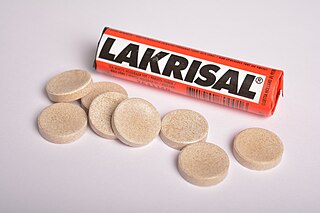
Lakrisal is a Malaco brand of salty liquorice sold in the Nordic countries and the Netherlands.

Halls is a British brand of a mentholated cough drop owned by Mondelēz International since 2015. In 2016, it was one of the biggest selling brands of over-the-counter medications sold in Great Britain, with sales of £32.5 million.
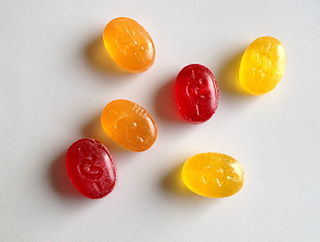
Ricola Ltd./RicolaAG is a Swiss manufacturer of cough drops, instant tea, tea bags, and breath mints. The head office of Ricola is located in Laufen, Basel-Country and has subsidiaries in Italy, Great Britain, Asia, and the United States. According to the company, it exports to around 45 countries in Europe, Asia, and North America.
Airwaves is a brand of sugarfree chewing gum produced by the Wm. Wrigley Jr. Company, and sold primarily in Europe and East Asia. The brand is marketed for its intense flavor similar to the effect one would get from the consumption of cough drops. This intensity of flavor is obtained by including Eucalyptus and Menthol in the candy coating of the tablets of gum.
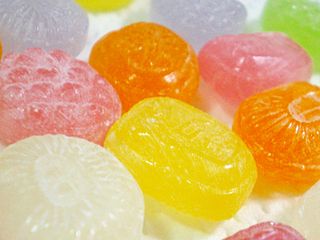
A pastille is a type of sweet or medicinal pill made of a thick liquid that has been solidified and is meant to be consumed by light chewing and allowing it to dissolve in the mouth. The term is also used to describe certain forms of incense.
Tunes is a brand of lozenge, manufactured by Mars Wrigley Confectionery in the United Kingdom. It is marketed as a cough sweet, or anti-congestant lozenge, containing eucalyptus oil and menthol. It is a relative of the now discontinued brand of Spangles, and shares the same packaging and dimensions of that brand. In the United Kingdom, Tunes no longer have the style packaging of Spangles.

Strepsils is a brand of throat lozenges manufactured by British-Dutch company Reckitt Benckiser. Strepsils throat lozenges are used to relieve discomfort caused by mouth and throat infections.

Luden's is an American brand of cough drop that is currently manufactured and sold in the US by Prestige Consumer Healthcare. Company headquarters are in Tarrytown, New York. Luden's products include Blue Raspberry, Honey Lemon, Honey Licorice, Kiwi-Strawberry, Orange, Original Menthol, Sugar-Free Wild Cherry, Watermelon, Wild Berry, Wild Cherry, and Wild Honey cough drops.
Lockets are a confectionery produced by the Wrigley Company in the UK and Czech Republic. They are sold as medicated supplement to help nasal congestion and sore throats.
William Henry Luden was the developer of the menthol cough drop, and founder of the Luden's company and brand.

The Smith Brothers were makers of the first cough drops produced and advertised in the United States, becoming one of the most famous brands in the country in its day.

Vicks VapoRub is a mentholated topical ointment, part of the Vicks brand of over-the-counter medications owned by the American consumer goods company Procter & Gamble. VapoRub is intended for use on the chest, back and throat for cough suppression or on muscles and joints for minor aches and pains. Users of VapoRub often apply it immediately before sleep.

Ambroxol is a drug that breaks up phlegm, used in the treatment of respiratory diseases associated with viscid or excessive mucus. Ambroxol is often administered as an active ingredient in cough syrup.
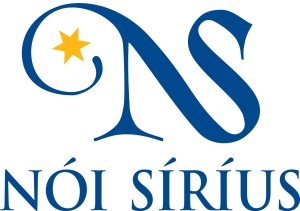
Nói Síríus is an Icelandic chocolate and confection manufacturer founded in 1920. The company is a wholly-owned subsidiary of the Norwegian Orkla conglomerate. Hallgrímur Benediktsson took over as main owner in the 1920s, and his grandson, Finnur Geirsson, was the company's president up until late 2021 when Lasse Ruud-Hansen took over after Orkla had Bought the rest of the shares in early 2021. Nói Síríus is Iceland's biggest candy producer and its candies have been a traditional part of camping trips since 1933, along with stockfish.
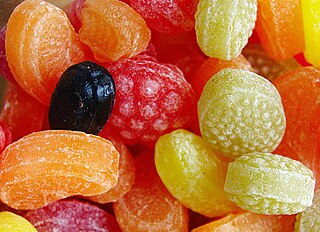
A hard candy, or boiled sweet, is a sugar candy prepared from one or more sugar-based syrups that is heated to a temperature of 160 °C (320 °F) to make candy. Among the many hard candy varieties are stick candy such as the candy cane, lollipops, rock, aniseed twists, and bêtises de Cambrai. "Boiled" is a misnomer, as sucrose melts fully at approximately 186 °C. Further heating breaks it into glucose and fructose molecules before it can vaporize.

Vocalzone Throat Pastilles is a brand of throat pastille, or throat lozenge, used to help keep a speaking or singing voice clear during public performance and singing. The company was founded in 1912 by William Lloyd, who adapted a medicine he had created for the tenor Enrico Caruso into a pastille form. After Lloyd’s death in 1948, Vocalzone was sold to Ernest Jackson in 1955 before later being acquired by Kestrel HealthCare Limited in 1993.
























